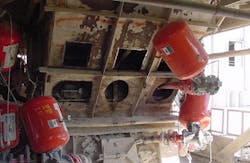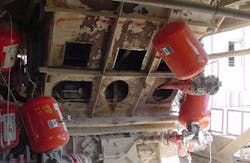Installing a network of air cannons eliminated build-up problems in the Nebraska plant precalciner of a large American cement maker.
Twenty-five cannons firing a prescribed pattern of compressed-air discharges remove material adhering to the vessel walls. Material flow improved, maintenance was reduced and productivity gained. Downtime and the need for water-blasting — which too often caused material lumps to fall into the kiln feed — are avoided.
Ash Grove Cement is the sixth-largest U.S. cement producer, with nine manufacturing plants, two deep-water import terminals and major quarry operations in Blubber Bay, British Columbia. Its total annual capacity is nearly nine million short tons of cement, including specialty products for difficult service environments. A pioneer of the lime and cement industries, the company was incorporated in Missouri in 1882 as the Ash Grove White Lime Association.
On the south bank of the Platte River between Omaha and Lincoln, the Louisville, Nebraska, facility outputs about one million short tons per year of Portland and blended cement.
How it was
Operators knew any material buildup in the precalciner impeded flow through the preheater and into the kiln. Staff used the common technique of water lancing to remove blockages, particularly from the preheater tower’s riser duct. But the time-consuming process had to be repeated twice daily, when maintenance personnel would open access doors into the tower and remove the accumulation with a high-pressure spray.
"Efficient material flow is a critical element of dry-process cement manufacturing. Accumulation or blockages can take a big bite out of a plant’s profitability," explains Martin Engineering’s Andy Marti. "Although many plants still use manual techniques to remove build-up, the cost of labor and periodic shutdowns has led others to investigate more effective means for dealing with this type maintenance."
To prevent the loss of efficiency and clinker quality at Ash Grove Louisville, a group led by process engineer Mark Junkins examined the situation. They met with material handling experts from Martin Engineering, and together configured a network of Martin XHV Air Cannons Air Cannons for the main production line.
The air cannons were installed during a scheduled maintenance outage, starting where the accumulation appeared most severe: below the riser orifice, where the duct is reduced in size to increase velocity. A cannon requires no high-temperature discharge pipes or special mounting plates, and discharge nozzles are embedded directly in the refractory lining of the preheater tower.
Air cannons in the main production line network are equipped with a negative pressure-firing valve specified for performance and service in preheater towers, clinker coolers and other high-temperature applications.
The cannons discharge in a timed sequence that moves in an upward spiral around the tower. Cannons fire about 20 seconds apart, with the entire cycle taking just more than eight minutes to complete. Control room operators can alter the schedule to accommodate a range of kiln pressures and operating conditions, extending the sequence to as much as 45 minutes.
A crew from Martin Services installed the entire system, including cannons, air lines and controls, as well as the thermo-safety shields on each unit. Operating like trap doors, the sliding shields bolt in between the air cannon valve and mounting flange, helping to protect workers from exposure to severe heat, gases and high-temperature materials.
Keep on going
Based on its initial air-cannon success, Ash Grove moved to its second production line. For that, engineers designed a network of 15 additional air cannons equipped with exhaust valves, viz., Martin Tornado Exhaust valves, which Martin Engineering describes as the latest advancement in air cannon valve design. The valve fires in response to a positive air pressure surge delivered by a solenoid valve, which can be located as far as 200 feet away.
The unique design improves air cannon safety, since the discharge sequence requires a positive signal. Unlike negative pressure-firing designs, a cannon equipped with the Tornado valve will not discharge accidentally in response to a pressure drop. An air supply failure or broken line won’t trigger its firing. In addition, this positive-acting valve amplifies the discharge force, delivering up to 20 percent greater force than a standard XHV-equipped air cannon of the same size.
With the new air cannon network in place, the Louisville plant has reduced water blasting. Material now flows more efficiently, and maintenance man-hours are reduced.
"We still hydro-lance occasionally, because of changes in raw material or fuel," Junkins explains. "But we don’t have the issues we had before. We can see that the air cannon system has paid for itself, by allowing us to maintain production rates."
Founded in 1944, Martin Engineering supplies bulk-material handling products for cement, clinker, rock, aggregate, coal, biomass, feed pellets, grain and other materials. For more information, visit www.martin-eng.com or call (309) 852-2384. Global representatives for Martin Engineering can be found at www.martin-eng.com/rep-finder



